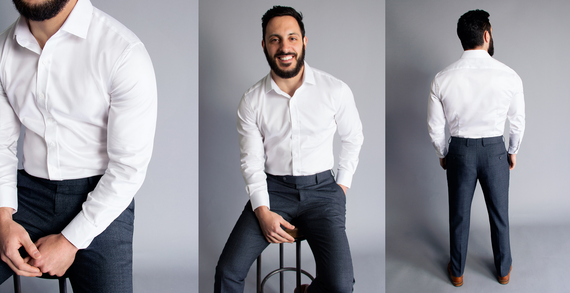In an ironic twist, although men admittedly don't like shopping, it is menswear that is outpacing womenswear growth. A recent Euromonitor International report stated the menswear market last year increased 4.5% to $440 billion while womenswear only increased by 3.7%. This seems to be driven by many cultural shifts. There's the rise of popular media protagonists, think Don Draper in Mad Men, or Lebron James on the cover of GQ. Most men still don't like the traditional clothes shopping experience of going to a mega-mall, waiting in line to try on clothes, and being sold to by commissioned clerks. However with the proliferation of the internet, and ever-increasingly liberal returns policies, shopping has become more frictionless. And perhaps even more socially ingrained; "The classic male archetype has been pretty misogynistic, sexist and slightly fascist and I think that's broken down quite a bit over the last 20 years. It makes more sense in a world that is becoming less patriarchal that the male identity would shift to allow for something like fashion or style, once considered feminine and therefore unacceptable, to be adopted," said Jeremy Lewis, editor of fashion magazine Garmento. Much of this is also being driven by innovation, mostly on the supply-chain and distribution side, of new market entrants. Business Insider recently highlighted 12 menswear startups, six of them were custom, and another five were subscription-models.
If men do finally care about the way they look, what drives looks in menswear is fit. The singular marketing message sent to men over the last 10 years is that fit matters, it's the most consistent motif in menswear. Slim fit, tailored fit, relaxed fit, custom fit, and all the other variations. That's how J.Crew splashed back onto the menswear scene with the Ludlow fit. When Brooks Brothers introduced the Slim Fit, it worked so well they brought us the Super Slim Fit. And now we're at a new height in fit consciousness for men, they're actively concerned about torso tapering, pant break, and showing a little a quarter inch of cuff under their jacket. That's why it's not surprising: "Nobody knew about bespoke suits before, unless you were wealthy. Now the common guy is wearing them. It used to be an underground market--now it's at street level," says Marshal Cohen, chief industry analyst at consumer research firm NPD group. He anticipates custom will grow from one percent to two to three percent in the next couple of years, which equates to billions in value being created. Brands that have started in the last five years, Indochino, J.Hilburn, TruMaker and Blank Label have all attracted venture capital.
More than just moving purchasing online, to make it even less work for men, a new crop of startups are providing subscription services that deliver new products every month. Traditionally a category reserved for low-end commodities like toilet paper and shaving supplies, men have taken that habitual behavior to accessories, shirts, casual wear and even face creams. These services usually cost somewhere in the range of $20 to $50, they learn a little about who you are through an online questionnaire, and then send you new curated products every month. They've also been able to convince investors this is going to be a big market with Bombfell, Frank & Oak, Birchbox Man all attacking tens of millions in financing.
What used to be in the realm of early adopters, or metrosexuals, has become so normalized and hit mainstream. Wearing a well fitting suit, tapered jeans, a pocket square and taking the time to comb your hair no longer warrants a double take. All of this points to one thing - happier significant others.
Danny Wong is the co-founder of Blank Label, an award-winning luxury menswear company. He is also a digital marketing consultant and freelance writer. To connect, tweet him @dannywong1190.

